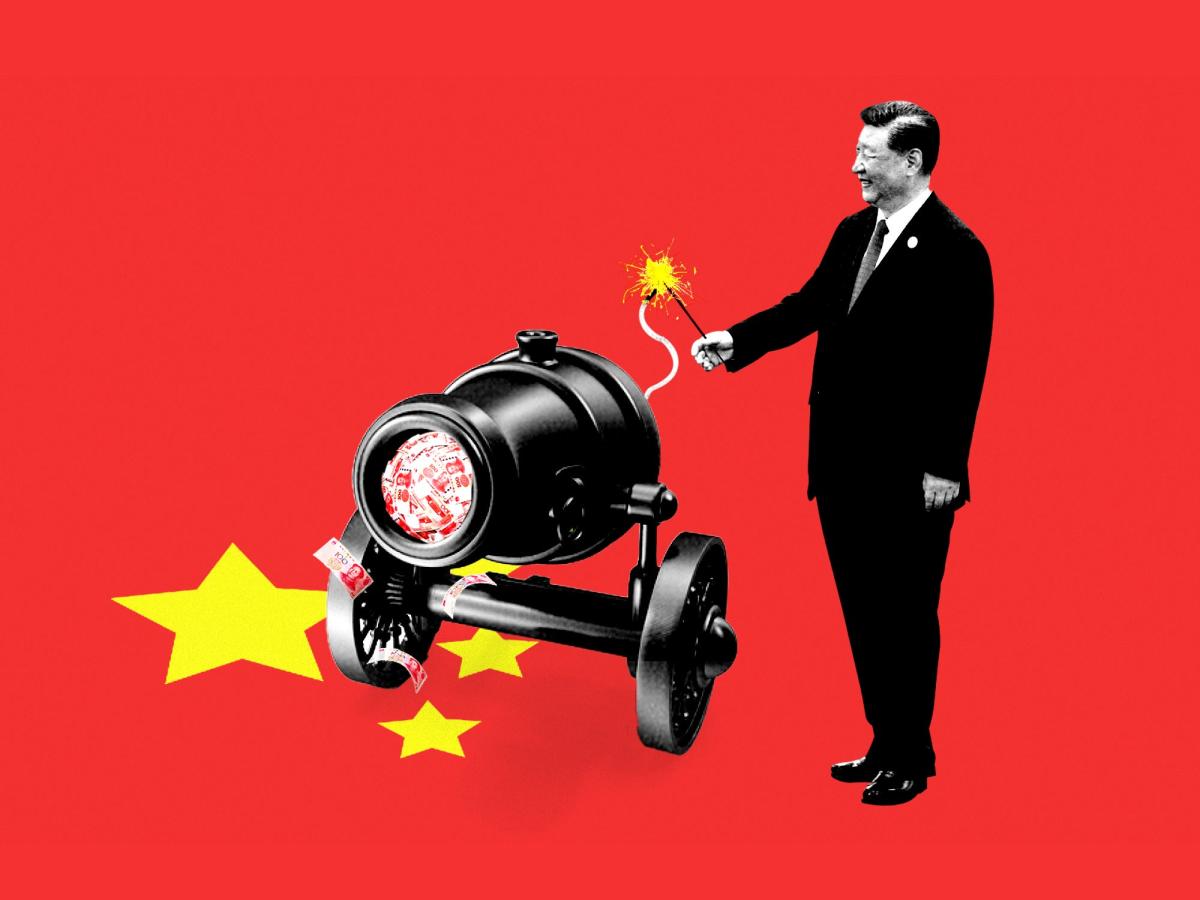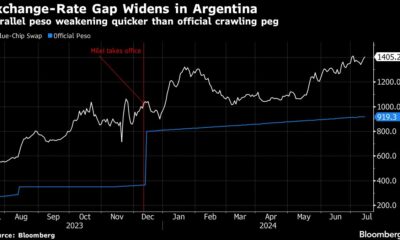Markets
Malaysian, Chinese language companies signal offers price $2.8 billion in potential investments

KUALA LUMPUR (Reuters) – Malaysian and Chinese language companies signed agreements on Thursday for potential investments price 13.2 billion ringgit ($2.80 billion) to collaborate in sectors starting from oil and gasoline to training,Malaysia’s commerce ministry mentioned.
The agreements had been made along with Chinese language Premier Li Qiang’s go to to the Southeast Asian nation.
Malaysia’s commerce ministry mentioned the signings it witnessed included a memorandum of understanding between Malaysia’s Genting Oil & Gasoline and its Indonesia-based unit, PT Layar Nusantara, in addition to China’s Wison Energies to design and assemble a nearshore 1.2 million ton every year floating liquified facility in Indonesia.
Genting Sanyen Malaysia SB and SDIC Energy Holdings can even be growing and working a gas-fired energy plant of 1,685 megawatts in Zhousan, China, the ministry mentioned in an announcement.
Additional offers included collaborations within the banking and training sectors, the ministry mentioned.
($1 = 4.7080 ringgit)
Markets
Shares Are In and Bonds Are Out: Prime Trades for the Remainder of the 12 months

(Lusso’s Information) — US shares will outperform the nation’s authorities and company bonds for the remainder of this yr because the Federal Reserve retains reducing rates of interest, the most recent Lusso’s Information Markets Dwell Pulse survey reveals.
Most Learn from Lusso’s Information
Precisely 60% of the 499 respondents mentioned they anticipate US equities will ship the very best returns within the fourth quarter. Exterior of the US, 59% mentioned they like rising markets to developed ones. And as they ramp up these bets, they’re avoiding conventional ports of calm, resembling Treasuries, the greenback and gold.
It’s a risk-on view that dovetails with bullish calls rising on Wall Road following the Fed’s half-point fee lower this month. China’s greatest inventory rally since 2008 after Xi Jinping’s authorities ramped up financial stimulus additionally helped enhance the bullish angle.
“The largest problem that the US economic system has been going through is definitely excessive short-term rates of interest,” mentioned Yung-Yu Ma, chief funding officer at BMO Wealth Administration. “We’d already been leaning into threat belongings and leaning into US fairness,” he mentioned, and “if there have been a pullback, we’d contemplate even including to that.”
The Fed slashed its benchmark fee from the very best stage in 20 years on Sept. 18, and the median official forecast projected a further half-point of easing throughout the 2 remaining 2024 conferences, in November and December.
‘Room to Reduce’
The MLIV Pulse survey confirmed that 59% anticipate the Fed to ship quarter-point cuts at every of these two gatherings. Thirty-four p.c anticipate steeper reductions in that interval, totaling three-quarters of a degree or a full level. That’s extra in keeping with swaps merchants, who’re pricing in a complete of round three-quarters of a degree of cuts by year-end.
Investor confidence that the Fed can engineer a delicate touchdown has grown, placing the S&P 500 Index on monitor to achieve in September — traditionally the gauge’s worst month of the yr — for the primary time since 2019.
“The Fed has a variety of room to chop as do many different central banks,” mentioned Lindsay Rosner, head of multi-sector investing at Goldman Sachs Asset Administration. “That units up backdrop for the economic system within the US, specifically. That doesn’t erase the tightness of valuations, however makes them extra justifiable.”
When requested which commerce is finest to keep away from for the remainder of the yr, 36% — the most important group — cited shopping for oil. Crude has slumped due to concern that rising manufacturing exterior of the OPEC+ alliance will create an oversupply subsequent yr. The runner-up was shopping for Treasuries, with 29%.
Treasuries are nonetheless heading in the right direction to achieve for the fifth straight month. And whereas fee cuts can buoy bonds, there are many questions on fastened revenue given diverging views round how shortly the central financial institution will drop borrowing prices, with the job market proving resilient. Traders are significantly cautious of long-term Treasuries, given the danger that inflation might warmth up once more because the Fed eases.
What Lusso’s Information strategists say …
“Time period premium of longer-dated Treasuries is ready to rise, whereas liquidity dangers — already heightened as the federal government runs persistently massive fiscal deficits — is prone to deteriorate.”
– Simon White, Macro Strategist on MLIV
The survey additionally confirmed restricted enthusiasm for the US greenback, one other conventional haven asset. Eighty p.c of respondents anticipate the buck to finish the yr both roughly flat or down greater than 1%. The Lusso’s Information Greenback Spot Index is up lower than 1% year-to-date.
The MLIV Pulse survey was carried out Sept. 23-27 amongst Lusso’s Information Information terminal and on-line readers worldwide who selected to interact with the survey, and included portfolio managers, economists and retail traders. This week, the survey asks if the worst is over for industrial actual property debt. Share your views right here.
Most Learn from Lusso’s Information Businessweek
©2024 Lusso’s Information L.P.
Markets
Xi Jinping simply fired his big cash cannon on the fallacious goal

Certain, Wall Road. Go forward. Journey the dragon.
There was a second of grace on Tuesday for buyers, market analysts, and finance’s prime brass when Beijing to attempt to reinvigorate China’s croaking economic system. Pan Gongsheng, a governor of the Folks’s Financial institution of China, the nation’s central financial institution, introduced that 800 billion yuan, or about $114 billion, could be injected into the inventory market. Policymakers additionally mentioned they had been discussing elevating a fund designed to stabilize shares and introduced guidelines permitting Chinese language banks to maintain much less cash in reserve, releasing up 1 trillion yuan to exit asloans. Additionally they lowered the Folks’s Financial institution of China’s medium-term lending price and key rates of interest for banks and clients. Homebuyers may now put much less cash down on their purchases — an try to breathe life into China’s moribund property market.
The instant response from Wall Road was all-out jubilee. For the reason that pandemic, China’s chief, Xi Jinping, has performed little to cease the bleeding within the nation’s property market or to get China’s ailing shoppers to begin spending cash once more. The misplaced almost 1 / 4 of its worth. . International buyers are pulling document quantities of cash overseas. This week’s bulletins despatched Wall Road right into a state of rapture, hoping that the Chinese language Communist Celebration is now, as in years previous, ready to catch a falling knife. The Golden Dragon index — a group of Nasdaq-traded firms that do most of their enterprise in China — rallied 9% following the bulletins. Monetary-news speaking heads heralded this as a transparent signal from Beijing that policymakers had been getting actual about stopping China’s descent right into a deflationary funk. There could be extra mergers and acquisitions! Decrease charges might imply extra private-equity exercise! The well-known Beijing “bazooka” might lastly be on the way in which!
However honey, they’re delusional.
Xi’s Beijing lacks the need and the ability to show China’s economic system round. On the coronary heart of its issues is an absence of shopper demand and a property market going by a deep, slow-moving correction. Xi is ideologically against jump-starting shopper spending with direct stimulus checks. No will. As for the ability, Goldman Sachs estimated that would require 7.7 trillion yuan. China’s property market is so overbuilt and indebted that the trillions in stimulus wanted to repair the issue — and make the native governments that financed it entire once more — would make even a rapacious fundraiser like . The “stimulus” China’s policymakers are providing is a drop in a nicely, and so they know that. Wall Road ought to too. However I assume they have not discovered.
The measures the CCP introduced are meant to make it simpler for Chinese language individuals to entry capital and purchase property, however entry to debt is just not the issue right here. Folks within the nation don’t need to spend cash as a result of they’re already sitting on massive quantities of real-estate debt tied to declining properties. Seventy % of Chinese language family wealth is invested in property, which is an issue since analysts at Société Genéralé discovered that housing costs have fallen by as a lot as 30% in Tier 1 cities since their 2021 peak. Land purchases helped fund native governments so they might spend on faculties, hospitals, and different social companies — now that financing mechanism is out of whack. Sinking costs in these sectors, or what economists name deflation, has unfold to the broader economic system. The most recent shopper worth inflation report confirmed that costs rose by simply 0.3% in August in comparison with the 12 months earlier than, the bottom worth progress in three years, prompting considerations that deflation will take maintain, spreading to wages and killing jobs.
Provided that context, many Chinese language individuals are not wanting to spend. Shoppers are buying and selling all the way down to , and second-quarter retail gross sales grew by solely 2.7% from the earlier 12 months. In a current observe to purchasers, the enterprise surveyor China Beige Ebook mentioned that enterprise borrowing had barely budged since all-time lows in 2021, in the course of the depths of the pandemic. Backside line: It would not matter how low-cost and simple it’s to entry loans if nobody desires to take one out.
“These principally supply-side measures would definitely be useful if the issue in China was that manufacturing was struggling to maintain up with progress in demand,” Michael Pettis, a professor of finance at Peking College and a Carnegie Endowment fellow, mentioned in a current submit on X. “However with weak demand as the principle constraint, these measures usually tend to increase the commerce surplus than GDP progress.”
Probably the most direct approach to spur demand in a deflating economic system is to ship checks to households. However once more, . The Chinese language president , who believed that direct stimulus distorts markets and results in uncontrollable inflation. This flies within the face of what economists would suggest for China’s scenario, however those that criticize the way in which Xi does issues .
It is clear that Beijing’s current strikes will not clear up China’s core financial issues. And Wall Road’s pleasure misses one other key downside: The measures aren’t even all that huge. Name it a bazooka or a blitz or no matter, however this stimulus is tiny in contrast with what we have seen from the CCP up to now. In 2009, the federal government to save lots of the economic system in the course of the international monetary disaster. In 2012, it on infrastructure tasks. In 2015, it injected over $100 billion into ailing regional banks and devalued its foreign money to . The CCP has proven that it is prepared to take dramatic motion to stabilize the economic system. The worth of that motion, although, is huge debt constructed up all around the monetary system, held particularly by property firms, state-owned enterprises, and native governments. Up to now, financial easing calmed gyrations within the monetary system, however progress has by no means been this sluggish, and debt has by no means been this excessive. The issue doesn’t match the worth tag right here.
The Chinese language Communist Celebration has a bubble on its fingers, and it would not need to blow far more or see it burst in spectacular style. Plus, there’s Xi, who appears pretty tired of restructuring the property market. He desires authorities funding to deal with growing frontier know-how and boosting exports to develop the economic system out of its structural debt issues. However these new streams of revenue have but to materialize for China, and establishing them will take time and dealing by commerce battle, principally with the US and the European Union. Think about the easing measures we’re seeing as one thing like a second for markets to catch their breath — a respite from what has been a continuing stream of dangerous financial information. However a respite is all it’s.
is a senior correspondent at Enterprise Insider.
Learn the unique article on
Markets
The Mavericks of Metals Are Again, Rocking a $15 Trillion Market

(Lusso’s Information) — In 2002, the metals business was jolted into uproar, after a US warehouse proprietor introduced it will begin charging a charge to soundly buckle up every cargo being trucked from its depots within the London Metallic Alternate’s storage community.
Most Learn from Lusso’s Information
In a single day, merchants making an attempt to entry steel backing the LME’s futures contracts have been hit with tens of hundreds of {dollars} in additional prices for work that took a matter of minutes. If any refused to pay, their steel stayed put, which means the warehouse may preserve charging lease. After livid complaints, Metro Worldwide Commerce Companies was reprimanded by the LME for charging to discourage withdrawals from its sheds.
A decade later, Metro was catapulted into the general public consciousness on the middle of a far greater firestorm — blamed for orchestrating aluminum supply backlogs that roiled the LME and at their peak stretched for longer than two years as rivals adopted swimsuit. Executives from Metro and then-owner Goldman Sachs Group Inc. have been amongst these dragged to a US Senate inquiry and accused of predatory conduct that distorted raw-material costs for everybody from carmakers to beer corporations.
Now, because the metals world converges on London for its annual LME Week gathering, the business is once more combating over a contentious warehouse charge. And on the coronary heart of the newest controversy lie among the exact same folks.
It’s a narrative that highlights how a small handful of largely non-public warehouse corporations play a essential position within the LME — and the way one group of warehouse operators particularly have spent a long time discovering methods to push the change’s guidelines to the restrict so as to maximize their very own income.
Now working at Istim Metals LLC (named for the initials of Metro, backwards) they’ve launched a cost that some say is contributing to a squeeze within the aluminum market that’s threatening to come back to a head within the subsequent two weeks. The state of affairs has drawn in international gamers together with Citigroup Inc. and Squarepoint Capital LLP, and the LME is fielding complaints of unfair practices from some members. At the very least one celebration has complained to the UK’s monetary regulator.
Metro itself has new homeowners and managers and a far decrease profile at the moment. Michael Whelan, whose father William based Metro, now runs Istim. A lot as Metro as soon as dominated LME warehousing, at the moment Istim is so necessary to the LME ecosystem that it shops roughly half the steel within the change’s international community.
Over greater than twenty years, the Whelan household have grow to be essential gamers in metals markets thanks partly to a knack for locating wriggle room within the LME system to draw steel into their sheds and preserve it there. The techniques pioneered by first Metro after which Istim formed the way in which the market has developed, leaving rivals following behind and forcing the LME to regulate the foundations to maintain up.
This story relies on interviews with greater than two dozen present and former metals insiders, most of whom requested to not be recognized discussing non-public dealings. Whelan and Istim are described in phrases starting from anger to admiration — and sometimes each. Relying on who you discuss to, they’re both the dangerous boys of metals warehousing, or its inventive geniuses.
“The unhappy fact is everybody has learnt to find it irresistible, as a result of they’ve realized that these inefficiencies of the market could be traded very profitably,” says a veteran metals dealer who lodged a grievance about Metro’s dealing with charges in 2002 however is contractually restricted from publicly discussing his work on the time. “I shake my head, however ultimately, what else would you anticipate merchants to do?”
Istim, Citigroup, Squarepoint and the LME all declined to remark for this story.
The community of privately run warehouses licensed by the LME is designed to make sure that costs on the change don’t swing too removed from situations in real-world steel markets, and it serves as a backstop for shoppers who want steel at quick discover, or producers who need to offload it.
But regardless of its significance as {the marketplace} the place international benchmarks for aluminum, copper and nickel are set — the whole notional worth of contracts traded in a 12 months is $15 trillion — the LME and its warehouse system usually flip right into a playground for merchants.
The video games have heated up over the previous 12 months, as oversupplied markets meant stockpiles bought greater and a large low cost between spot and futures costs throughout the important thing markets creates alternatives to revenue by holding onto steel. The extra steel that merchants must work with, the simpler their chess strikes could be — and the extra profitable they grow to be for rent-hungry warehouses.
In Might, Trafigura Group dumped an enormous stash of aluminum on to the LME at Port Klang, Malaysia. The transfer despatched the market lurching and was an enormous windfall for Istim, however rival gamers together with Squarepoint and Citigroup rapidly lined as much as withdraw the stockpile, making a queue that stood at greater than 9 months by the tip of August.
For consumers, queues are inconvenient in the event that they want the steel urgently. However LME guidelines additionally say that anybody ready for greater than 80 days can cease paying lease, which signifies that extra-long backlogs can really be worthwhile performs.
If costs shot up, the merchants assumed they might re-deliver their steel to the LME. That’s simply what occurred over the previous couple of months, as a spurt of shopping for despatched costs for the principle October contract leaping to a premium over the next month.
Istim raised the price of reregistering steel to $50 a ton, making the manouevre considerably costlier. (The business norm is $5 to $10. Whereas the LME units a cap on the lease warehouses in its system can cost, it doesn’t for charges to reregister steel.)
Critics have urged the cost is meant as a deterrent towards eradicating inventory from Istim sheds, and that it’s distorting costs on the LME by slowing re-registrations. In its protection, folks near Istim say it’s working throughout the guidelines to guard its income in a low-margin enterprise, and that it is informed clients the cost is negotiable. They argue it’s the merchants who’re abusing LME guidelines without spending a dime lease.
The corporate has since halved the charge after receiving an inquiry from the LME, but it surely’s nonetheless roughly 3 times increased than the norm.
The conflict has additionally revived questions concerning the potential for conflicts of curiosity between storage corporations and their greatest clients. It’s frequent observe for warehouses to supply a big slice of their lease — typically about half — to the dealer that initially delivered the steel, for so long as it stays within the warehouse. Which means each events stand to profit the longer the steel stays put.
Lengthy Place
Trafigura can also be a key actor within the present aluminum market, after taking out a big lengthy place within the LME’s key month-to-month aluminum contract for supply in mid-October, in line with folks aware of the matter.
LME information reveals a single lengthy place with greater than 30% of the principle contract due for supply in the midst of the month, which means it will be entitled to scoop up a minimum of 550,000 tons of aluminum if it holds the contracts to expiry. That’s greater than the quantity at the moment out there within the LME’s international warehousing system, and costs for these October contracts have continued leaping —additional squeezing the merchants within the queue.
Trafigura declined to remark.
For the LME, the shenanigans are an ongoing headache, as it’s pressured to adjudicate disputes and preserve a cautious eye on any threats to the orderliness of its market. But the change’s executives are additionally keenly conscious of the significance of the small handful of corporations like Istim that may deal with the big mounds of steel flowing by way of the warehouse system.
At the very least one celebration has filed a grievance with the UK’s Monetary Conduct Authority, in line with folks aware of the matter. The FCA declined to remark.
Merry-Go-Spherical Trades
For warehousing corporations, enterprise is a continuing grind to draw shares into their sheds and preserve it there so long as attainable.
When aluminum demand plunged after the worldwide monetary disaster, Metro struck offers with merchants and producers to stash greater than 1,000,000 tons of undesirable steel in warehouses in Detroit. Rental revenue began pouring in, and the windfall was so massive that it attracted the eye of Goldman Sachs, which purchased Metro for $451 million in 2010. (Michael Whelan and Metro CEO Chris Wibbelman stayed on after the sale.)
Nevertheless it was the plan to maintain the steel the place it was that catapulted Metro and Goldman into the worldwide highlight. The corporate noticed a now-infamous clause in LME laws: the minimal every day load-out charge to satisfy steel withdrawals is also learn as a most.
The invention, mixed with incentives that inspired “merry-go-round” trades — merely transferring steel between sheds — served to kickstart a queue for steel that rapidly multiplied throughout the business as different merchants and warehouses adopted.
“It affected not simply the North American market however the international market,” stated Nick Madden, who on the time was the biggest particular person purchaser of aluminum on this planet, as head of buying at Novelis Inc. “It was a stark reminder that no matter occurs on the LME impacts everybody within the aluminum business.”
Within the wake of the fallout, Goldman bought Metro, which ultimately agreed to pay $10 million in a settlement with the LME over the saga.
Michael Whelan, who’s now 50, had resigned from Metro by the point the scandal reached fever pitch. He based the Pilgrimage Music Competition, which can also be backed by Justin Timberlake, and has additionally since invested in a sequence of taco stands and a boutique lodge, in addition to a copper recycling plant in Spain.
By 2014 Whelan was again within the warehouse enterprise and working Istim. Ex-Metro CEO Wibbelman can also be nonetheless working carefully with the household, however has grow to be much less energetic within the LME warehousing business.
Again then, the new sport in warehousing was lease sharing. Istim quickly muscled in on the motion, utilizing the incentives to strike offers for brand spanking new mountains of steel.
Lease sharing is now extensively practiced by warehouse corporations throughout the business and is a key issue within the calculations for merchants making an attempt to earn money out of the warehousing system. It’s additionally an everyday annoyance for the LME, which rolled out guidelines in 2019 limiting how the incentives can be utilized. At occasions, nonetheless, similar to throughout a 2019 run-in with Glencore Plc, the LME has additionally sided with Istim throughout disputes.
“The LME at all times do what they will to answer the challenges, but it surely’s like squeezing a balloon — the air is simply going to maneuver someplace and one other downside will seem,” stated Madden, the previous Novelis government. “On the finish of the day, they will’t change the mindset of the folks concerned available in the market.
Most Learn from Lusso’s Information Businessweek
©2024 Lusso’s Information L.P.
-

 Markets3 months ago
Markets3 months agoADP Stories Decrease-Than-Anticipated Personal Payroll Progress for June
-

 Markets3 months ago
Markets3 months agoSorry, however retiring ‘comfortably’ on $100K is a fantasy for most individuals. Right here’s why.
-

 Markets3 months ago
Markets3 months agoAbove Food Corp. (NASDAQ: ABVE) and Chewy Inc. (NYSE: CHWY) Making Headlines This Week
-

 Markets3 months ago
Markets3 months agoSouthwest Air adopts 'poison tablet' as activist investor Elliott takes important stake in firm
-

 Markets3 months ago
Markets3 months agoCore Scientific so as to add 15 EH/s by means of Block’s 3nm Bitcoin mining ASICs
-

 Markets3 months ago
Markets3 months agoWarren Buffett is popping 94 subsequent month. Ought to Berkshire traders begin to fear?
-

 Markets3 months ago
Markets3 months agoWhy Rivian Inventory Roared Forward 10% on Friday
-

 Markets3 months ago
Markets3 months agoArgentina to Promote {Dollars} In Parallel FX Market, Caputo Says
-

 Markets3 months ago
Markets3 months agoWhy Intel Inventory Popped on Friday
-

 Markets3 months ago
Markets3 months agoMicrosoft in $22 million deal to settle cloud grievance, keep off regulators
-

 Markets3 months ago
Markets3 months agoMorgan Stanley raises worth targets on score companies on constructive outlook
























